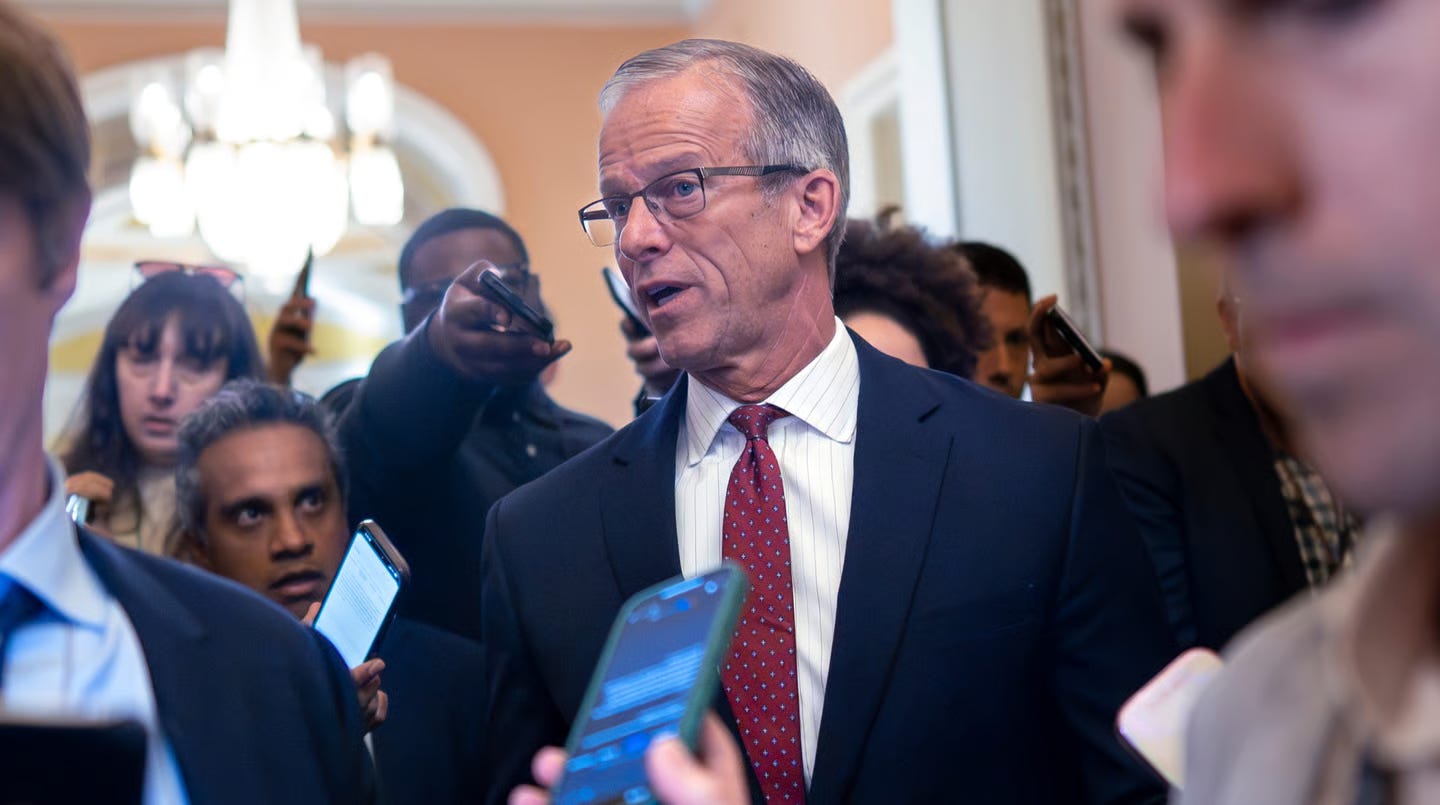Why piecemeal funding bills won’t solve the shutdown
Plus: The latest on the redistricting wars, House Dems demand Russell Vought reverse the RIFs and bipartisan senators team up for new conservation caucus.

👋🏾 Hi, hey, hello! It’s Tuesday morning— Day 28 of the government shutdown. If it extends seven more, it will tie the record for the longest in American history. In this morning’s edition, inside the politics of both parties’ aversion to advancing a series of standalone bills to address the most severe pain points of the shutdown.
The House hasn’t voted in 39 days. Speaker Mike Johnson (R-La.) told reporters on Monday that he is evaluating whether to bring the House back on a “day-to-day basis” but claims it’s not possible to return to regular order until the government reopens. The House remains on a 48-hour notice to return if called back. Johnson also said Republicans have a long list of ideas to address the high cost of health care and improve its quality. When I texted a Democratic aide this, they replied with the Marcia Brady “Sure, Jan” meme. Johnson added that House Majority Leader Steve Scalise (R-La.) had been working with committee chairs on options.
House Democrats will meet at 6 p.m. this evening for a closed-door caucus meeting. Democratic leadership, the Steering and Policy Committee and the Democratic Women’s Caucus will hold a hearing at 9 a.m. on strengthening the care economy and extending the Affordable Care Act's enhanced premium tax credits.
Vice President JD Vance will attend Senate Republicans‘ weekly policy lunch this afternoon to discuss tariffs ahead of a series of votes Democrats will force to repeal duties President Donald Trump has levied against Canada, China and U.S. global trading partners more broadly. The Supreme Court will hear oral arguments in a case that will determine whether the president’s tariffs exceeded his statutory authority under the International Emergency Economic Powers Act (IEEPA). More on that in tomorrow’s edition. It will also be interesting to learn the extent of any discussions between Vance and the Senate GOP about the shutdown while the veep is on the Hill. The Senate will vote on two judicial nominees before and after the weekly party lunches.
Trump is in Japan on the second leg of his Asia trip that started in Malaysia and will end in South Korea. He participated in a welcome ceremony with Japanese Prime Minister Sanae Takaichi before the two leaders held a bilateral meeting.
The Japanese leader commended the president for his efforts toward peace worldwide. She also noted his friendship with the late former Prime Minister Shinzo Abe.
She announced that Japan will gift 250 cherry trees as a contribution to the 250th anniversary ceremonies in the United States next year.
Trump expressed his appreciation for Japan’s increased military spending.
“I’d also like to congratulate you on being the first woman prime minister,” he said. “That’s a big deal.”
The president also participated in a troop visit, a visit to the USS George Washington aircraft carrier, and a reception and dinner with business leaders.
Now, back to how the push for piecemeal shutdown solutions came and went.
The glimmer of optimism that flickered over the weekend that Republicans could attempt to advance a series of narrowly focused funding measures to reopen small parts of the government has faded as the push for piecemeal bills to pay furloughed federal workers and military servicemembers, keep air-traffic controllers on the job and extending SNAP benefits before funding lapses this weekend is unlikely to go anywhere this week—or resolve the larger standoff that’s now barreling toward the end of its fourth week.
For one thing, there’s little appetite among Senate GOP leaders or the White House to move standalone measures while the broader shutdown fight drags on. Each narrow fix would relieve just enough public pressure to make it harder to force Democrats to accept the House-passed continuing resolution—the leadership’s preferred route to reopening government on their terms.
Senate Majority Leader John Thune (R-S.D.) told reporters that Republican senators would discuss the steps they’d like to take moving forward when he was specifically asked about Sen. Josh Hawley (D-Mo.)‘s bill to keep SNAP funded throughout the shutdown.
“But my view is what it has been from the very beginning, and that is to pay SNAP recipients, open the government,” he added. “I mean, it’s not complicated.”
Hawley said the bill would require a roll-call vote after it became clear he would be able to pass it by unanimous consent.
Thune sounded skeptical Democrats would even play ball if he allowed votes on the individual measures after they blocked a bill sponsored by Sen. Ron Johnson (R-Wis.) to pay federal employees who are working without pay in favor of counterproposals introduced by Sens. Chris Van Hollen (D-Md.) and Gary Peters (D-Mich.).
“Democrats are now voting against their public employee unions, who are coming out in favor of paying their workers and opening up the government,” Thune said in reference to AFGE, the largest federal workers union, which called on Congress this morning to pass a stopgap measure to end the government shutdown. We are where we are.”
Thune said he spoke to President Trump on Sunday night and suggested the administration was exploring its legal authority to use USDA contingency funds to cover some or all of the SNAP shortfall in November.
“There are ongoing conversations about where things stand. And he, like all of us, wants the government opened up, and I think he’s made that very clear, as we all have, and then these other issues that they want to discuss and debate,” the top Senate Republican added. “They want to vote [on the ACA tax credits]. I’ve said that. We’ll give you a vote. We’ll you a vote by a date certain but let’s open the government.”
Thune did not respond when asked whether he had spoken with Trump about getting directly involved in the negotiations on the path forward.
Then there’s the calendar reality. By the time the Senate gavels in this morning, the week is already half over. Thune has given no indication he’ll keep members in past Thursday afternoon. Without a time agreement, there’s virtually no way to process multiple bills through debate, amendment and final passage. Even if Republicans somehow passed them, the House is out, and members would need at least two days to return to Washington. Speaker Johnson’s commitment to the 72-hour rule for bill text would further delay any vote.
Democrats, meanwhile, want the focus to stay on a comprehensive funding agreement that preserves Affordable Care Act subsidies and locks in an appropriations deal insulated from what they view as the Trump administration’s partisan use of impoundment and rescission powers. Anything short of that, they argue, would simply prolong the uncertainty facing millions of Americans who rely on federal programs—and the economy at large.
Senate Minority Leader Chuck Schumer (D-N.Y.) continued to slam President Trump for leaving the country and refusing to meet with him and House Minority Leader Hakeem Jeffries (D-N.Y.).
“Americans have never seen a healthcare crisis like this, the one about to begin this Saturday, and Donald Trump is nowhere to be found,” Schumer said in a floor speech on Monday. “Instead of sitting down with Leader Jeffries and me, Trump skipped town for his second foreign trip in less than a month. Open enrollment is just days away, and Trump’s message to the American people facing financial disaster is ‘greetings from Malaysia.’”
○ ● ●
The fight over congressional maps is escalating nationwide as both parties maneuver ahead of the 2026 midterms. After traveling to Illinois to meet with top state Democrats about responding to Republican-led gerrymanders, Hakeem Jeffries said Illinois Democrats were committed to leaving all options on the table despite reported reservations about whether new maps would dilute Black representation.
In Indiana, Republican Gov. Mike Braun called a special legislative session for next week to redraw the state’s congressional districts and bring its tax code in line with new federal provisions—prompting the Democratic Congressional Campaign Committee to accuse him of trying to “insulate D.C. Republicans from voters” through an “extreme gerrymander.”
Democrats in Virginia are quietly discussing whether to revisit their own maps, while the DCCC filed a new lawsuit in North Carolina challenging the GOP’s latest “racial gerrymander.”
The flurry of activity follows Republican-led redistricting in Texas earlier this summer that added five GOP-leaning seats at former President Trump’s urging, setting off a coast-to-coast map war that’s now reshaping the 2026 battlefield.
● ○ ●
House Education and Workforce Committee Ranking Member Bobby Scott (D-Va.) and fellow committee Democrats are urging White House Office of Management and Budget Director Russell Vought to reinstate thousands of federal employees recently terminated from the Departments of Education and Health and Human Services.
In a letter sent Monday, Scott and his colleagues said the reduction-in-force (RIF) actions—carried out amid the ongoing government shutdown—were unlawful and have “severely undermined” both agencies’ ability to fulfill their missions. The lawmakers accused Vought of “flagrant disregard for civil service protections” and demanded immediate reinstatement of affected employees.
The cuts stem from OMB-directed staffing reductions that Vought authorized earlier this month, telling reporters that “the RIFs have begun.” At HHS, more than 1,300 employees at the Centers for Disease Control and Prevention were terminated, with additional layoffs across the Health Resources and Services Administration (HRSA) and the Substance Abuse and Mental Health Services Administration (SAMHSA).
At Education, roughly 465 employees were dismissed, including staff from the Office of Elementary and Secondary Education, the Office for Civil Rights, and the Office of Special Education and Rehabilitative Services—divisions that handle civil rights enforcement, disability services and K-12 oversight.
Committee Democrats argue that the mass firings violate federal law and exacerbate dysfunction during the shutdown. They’re calling on OMB to reverse the RIFs and to brief Congress on the criteria used to target specific offices and employees.
The episode underscores the tension between the Trump administration’s aggressive downsizing agenda and congressional oversight and raises broader questions about whether these sweeping cuts can stand without explicit congressional authorization or due process.
Separately, House Energy and Commerce Committee Ranking Member Frank Pallone (D-N.J.), Health Subcommittee Ranking Member Diana DeGette (D-Colo.), and Oversight and Investigations Subcommittee Ranking Member Yvette D. Clarke (D-N.Y.) wrote to HHS Secretary Robert F. Kennedy, Jr., voicing “serious concerns” with the illegal mass firings at the department. The Democratic committee leaders cited numerous errors and failures to follow required procedure in the agency’s RIF process, while warning that the firings come amid what they call the Republican health care crisis—marked by coverage losses, measles outbreaks, vaccine restrictions and widespread staff cuts at the CDC and SAMHSA.
Their letter requests documentation of any legal justification for conducting a RIF during a shutdown, details on the data discrepancies that led to nearly twice as many employees receiving termination notices as intended and assurances that HHS will comply with future court orders. Pallone, DeGette, and Clarke also pressed Kennedy to answer earlier committee letters from April 1 and May 28, warning that he is “willfully breaking the law and decimating public health.”
Read the full Education and Workforce letter →
Read the full Energy and Commerce letter →
● ● ○
Senate Energy and Natural Resources Committee Ranking Member Martin Heinrich (D-N.M.) and Sen. Tim Sheehy(R-Mont.) will launch the Senate Stewardship Caucus this evening at a celebratory reception at Union Station hosted by Nature is Nonpartisan.
At a time when the politics of conservation are increasingly polarized, the Senate Stewardship Caucus is positioning itself as a rare bipartisan bridge on environmental issues. But the group’s success may hinge on how President Trump’s second-term environmental agenda continues to take shape—and whether its emphasis on resource extraction and regulatory rollbacks becomes an asset or a liability for lawmakers trying to show that conservation and economic growth can coexist.
The Senate Stewardship Caucus says it will advance bipartisan efforts to protect and expand access to public lands and waters, recover wildlife, and restore habitat. Additional Senate Stewardship Caucus members attending the event are Sen. Catherine Cortez Masto (D-Nev.), Thom Tillis (R-N.C.), John Hickenlooper (D-Colo.), Steve Daines (R-Mont.), Chris Coons (D-Del.), and Katie Britt (R-Ala.).





